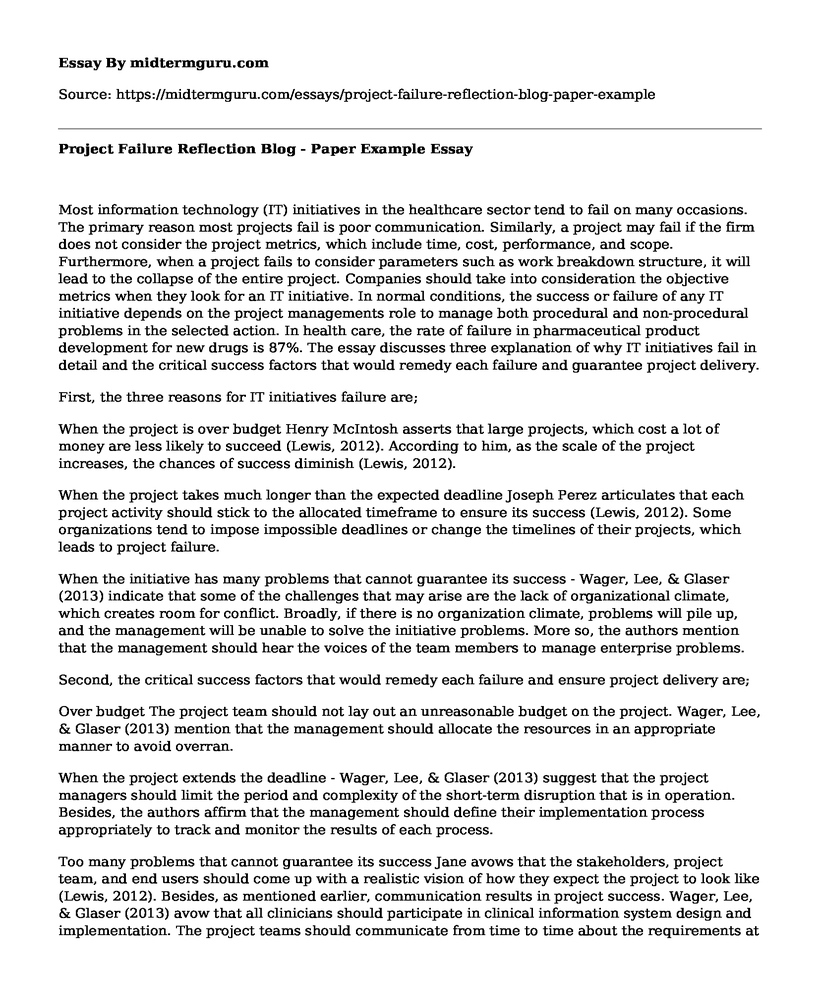Most information technology (IT) initiatives in the healthcare sector tend to fail on many occasions. The primary reason most projects fail is poor communication. Similarly, a project may fail if the firm does not consider the project metrics, which include time, cost, performance, and scope. Furthermore, when a project fails to consider parameters such as work breakdown structure, it will lead to the collapse of the entire project. Companies should take into consideration the objective metrics when they look for an IT initiative. In normal conditions, the success or failure of any IT initiative depends on the project managements role to manage both procedural and non-procedural problems in the selected action. In health care, the rate of failure in pharmaceutical product development for new drugs is 87%. The essay discusses three explanation of why IT initiatives fail in detail and the critical success factors that would remedy each failure and guarantee project delivery.
First, the three reasons for IT initiatives failure are;
When the project is over budget Henry McIntosh asserts that large projects, which cost a lot of money are less likely to succeed (Lewis, 2012). According to him, as the scale of the project increases, the chances of success diminish (Lewis, 2012).
When the project takes much longer than the expected deadline Joseph Perez articulates that each project activity should stick to the allocated timeframe to ensure its success (Lewis, 2012). Some organizations tend to impose impossible deadlines or change the timelines of their projects, which leads to project failure.
When the initiative has many problems that cannot guarantee its success - Wager, Lee, & Glaser (2013) indicate that some of the challenges that may arise are the lack of organizational climate, which creates room for conflict. Broadly, if there is no organization climate, problems will pile up, and the management will be unable to solve the initiative problems. More so, the authors mention that the management should hear the voices of the team members to manage enterprise problems.
Second, the critical success factors that would remedy each failure and ensure project delivery are;
Over budget The project team should not lay out an unreasonable budget on the project. Wager, Lee, & Glaser (2013) mention that the management should allocate the resources in an appropriate manner to avoid overran.
When the project extends the deadline - Wager, Lee, & Glaser (2013) suggest that the project managers should limit the period and complexity of the short-term disruption that is in operation. Besides, the authors affirm that the management should define their implementation process appropriately to track and monitor the results of each process.
Too many problems that cannot guarantee its success Jane avows that the stakeholders, project team, and end users should come up with a realistic vision of how they expect the project to look like (Lewis, 2012). Besides, as mentioned earlier, communication results in project success. Wager, Lee, & Glaser (2013) avow that all clinicians should participate in clinical information system design and implementation. The project teams should communicate from time to time about the requirements at the beginning of the project and maintain touch throughout the project to avoid misunderstandings.
In summary, the IT initiatives in health care are bound to fail when the projects have a narrow scope, has an over budget, and exceeds the time limit. Most importantly, the clinicians should view the clinical information systems as an operation factor and not an incentive. Additionally, the project planners should set a realistic schedule and never plan more than they can control. As well, the clinicians should have a work breakdown structure to make their job easy throughout the project. Overall, any project success involves the leadership and teams effort.
References
Lewis, P, J. (2012). Major Causes of Project Failure and How to Prevent Them. You Tube Retrieved from https://www.youtube.com/watch?v=smTDjfrySTM
Wager, A, K., Lee, W, F., & Glaser, P, J. (2013). Health Care Information Systems: A Practical Approach for Health Care Management. Third Edition. San Francisco: John Wiley and Sons.
Cite this page
Project Failure Reflection Blog - Paper Example. (2021, May 26). Retrieved from https://midtermguru.com/essays/project-failure-reflection-blog-paper-example
If you are the original author of this essay and no longer wish to have it published on the midtermguru.com website, please click below to request its removal:
- Researching Technology Policies
- The Forces That Are Reshaping the Management and Organizational Culture
- Ethics and Sustainability Ford Motors Company - Paper Example
- Background and Rise of the Eastman Kodak Company - Paper Example
- Essay Example on the Multigenerational Workplace
- Application Letter to MSc in Software Engineering
- Entrepreneurial Leadership and Management: Keys to Business Success - Essay Sample







